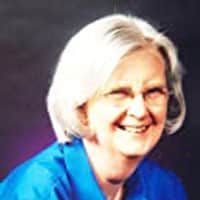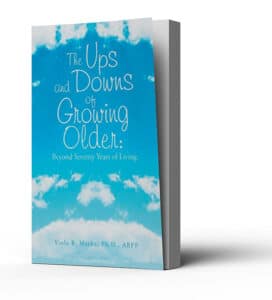
In her long working life as a psychologist, Viola Mecke, who taught at Stanford and Cal State, helped people untangle life’s complications and setbacks.
Now retired, Mecke, 94, lives the adage “Physician heal thyself,’’ by working on thinking positive and living productively, including writing a book, “The Ups and Downs of Growing Older: Beyond Seventy Years of Living,’’ a spirited meditation that’s filled with practical and realistic ways of coping with being “the old old.’’
 “It is my hope to provide a discussion and guidelines to ease some difficulties encountered and to recognize the strengths that enable long living. I hope to share the admiration, awe, and understanding of the wonders of long life,’’ Mecke writes in her book.
“It is my hope to provide a discussion and guidelines to ease some difficulties encountered and to recognize the strengths that enable long living. I hope to share the admiration, awe, and understanding of the wonders of long life,’’ Mecke writes in her book.
One of those wonders is nature, where Mecke immerses herself in a daily walk at her home in Gainesville, Fla.
“I walked a mile and a half today. I’m in an independent living home that’s spread out over several acres and has probably four or five little ponds. The one that I walk around takes me around a mile and a half,’’ Mecke said by telephone.
She used to walk with friends but gave that up because she found she couldn’t walk and talk simultaneously and still enjoy the sound of birds or the quiet of the outdoors.
Maintaining independence
Mecke’s book has chapters on why we age and what kind of person we are likely to become if we reach old old age; how we can hold onto our independence by staying engaged and keeping active; why elderly people fall; how to select a suitable home for aging in place; and how to navigate relationships with children and grandchildren.
“The youngest person in my community is 60; the oldest is 106. I have not yet told myself that I am a very old person, or that I am elderly.’’
“The youngest person in my community is 60; the oldest is 106,’’ Mecke said. “I have not yet told myself that I am a very old person, or that I am elderly.’’
She writes that one of the antidotes to depression is to spend time outdoors, as she does, and to find something new each day to discover.
“Contact others, and get involved in hobbies: plan to be in control of your life,’’ she said.
Each evening, she makes a list of what goals she has for the next day — such as taking a walk, reading a book, meeting with friends.
Finding a community
Mecke, a widow, was raised in rural Ohio. She is an emerita professor from the California State University, and an emerita professor (adjunct) of Stanford University Medical School, Department of Psychiatry and Behavioral Sciences.
“When my sister became ill here in Gainesville, I sold my house (in California,) and came east to be with her. When you move into a new community — I was 88 or 89 when I came here — it’s a big adjustment because you move into a new culture; even the food is different.’’
On finding suitable housing for one’s old age, Mecke says choices depend on several factors.
“It depends on how healthy you are. One should find a home that is fit for aged people — you don’t want steps; you need a bathroom that has handrails around it.
“And independent living community relieves you of the stress of cooking, or taking care of the house. I take my meals at the restaurants in my community [although she has a kitchen]. I enjoy eating with people. Physical safety, nurturing in terms of basic needs and social attachments come with independent living.
“The one thing about being older is the positivity that comes with age, and with that is an expectation of doing things that makes you feel very good about life, like hobbies and recreation. I play Scrabble, and I love to play!
“Mental deterioration is not an inevitable function of aging.’’
“Mental deterioration is not an inevitable function of aging,’’ she says.
A full schedule
Mecke’s day begins at 6 a.m. with a cup of coffee and toast, followed by 30 minutes of exercise, then her walk, and then to her den, where she checks her laptop for emails.
By 9 a.m., she is writing until lunch, and following lunch, she writes for two more hours.
“Because I live alone, there are few intrusions. And because I am health-oriented, the writing may be temporarily stopped to move about for the good of my legs. By 4 p.m., I stop, visit with friends, have dinner in one of the restaurants here, attend a program when possible, watch some television, and am in bed by 10:30.
I shall attempt to finish one more book [about hurt children], and then hope to relax, with some writing by trying poetry,’’ she said.
The biggest fears
Interestingly, Mecke says that although she has written four books, “I have never considered myself a writer. I still consider myself a psychologist. My thoughts and feelings are oriented to listening, and understanding myself and others — let alone the world’s situations around me.’’
As a psychologist, she said her patients most feared death, and in life, the loss of memory, loss of thinking and loss of control over finances. Often, she said, these infirmities follow a loss of being able to walk, which can contribute to a perception of loss of control and one’s self esteem.
Mecke remembered the first time a younger person held a door for her, out of a polite impulse to help an older person. She said such impulses can be driven by a belief that all older people are infirm. That can lead to thinking that the elderly are a costly drag on society.
“There was a social media comment that said old people were costing too much money and that all old people should be killed,’’ Mecke said.
She cited studies that show Americans viewed the elderly in a positive light from 1810-1879, but 100 years later, that view had changed to negative. The increased medicalization needed to extend lives is seen as one reason for the change in attitude.
But with the increase in an aged population due to medicine, nutrition and good genes, Mecke said the number of those living alone in old age will continue to increase.
An American problem
“Getting older is called the disability zone!’ My sense is age discrimination is not getting better. Years ago, the words used to describe old people were ‘esteemed’ and ‘gentle.’ Now, it’s, ‘Here comes the old man.’ ‘’
To the question of whether insulting the old is a peculiarly American habit, Mecke said to a great extent, yes.
“Youth is exalted and promoted in America, but in other countries and other cultures, such as in Spain and in Asia, older people are given a role important in terms of who they are, how they fit in with the family; so in that respect, they are honored and esteemed,’’ she said.
In “The Ups and Downs of Growing Older,’’ Mecke discusses summing up one’s life.
“If you are getting near the end of life, when you are dying, it is your responsibility to let people know they have been loved. You should forgive anyone who you think has offended you. And ask for forgiveness for anything you have done that has insulted or hurt someone. You are leaving life in the way that leaves pleasant memories.’’
In a four-decade career in journalism, Eleanor O’Sullivan has reviewed many books on best practices for financial advisors, has written for Financial Advisor and the USA Today network, and was the movie critic for the Asbury Park Press.







